Text
Book Review: ‘Needful Things’ by Stephen King
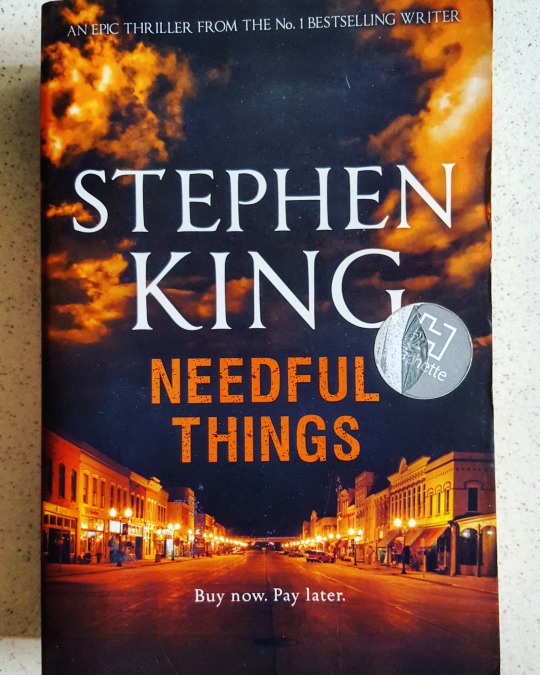
This is another adventure in Stephen King’s town of Castle Rock in Maine. Leland Gaunt sets up a mysterious shop in town called Needful Things. And one after another, the townspeople visit his shop and buy something that catches their eye. It doesn’t only catch their eye in the “I-could-buy-that-it-looks-nice” kind of a way but something about those objects pulls them in to the point that they desire to have them. The objects range from a baseball card to a Elvis poster. The price of these objects are kept at a surprisingly small amount which makes the objects even more desireable. However, Leland sets an additional price. He requests each customer to do a little “deed” in exchange. The “deeds” seem innocent enough at first like practical jokes and pranks played on other townspeople: a small price to pay for such a precious object. However, these pranks soon take a violent turn and the entire town falls in violence, murder and uproar.
Reasons why I loved the book beyond it being Stephen King’s usual healthy dose of creepy is that he explored concepts like materialism and human greed and how far these things could make a person fall. He showed how at some point a mere material possession could become more important than human life itself. But other than these heavy concepts, there was gore, suspense, drama,humor and quite a large number of characters, all of them relatable in some way or the other. This was a book that left me shaken by the time I was finished with it.
There was however, something I did not like about the book. The book was pretty long,over 700 pages and at some points the story would get quite repetitive and monotonous. It would take a long time to get past those vacuums and regain momentum again. The vast array of characters also takes a while to get used to and to remember.
But other than that King’s writing was impeccable and the way he created suspense after suspense will keep you drawn in and the sudden end to a particular building suspense will leave you speechless and probably make you want to go back and read that part again. I would definitely recommend this book as something spooky for this Halloween or any other time to be honest. It is definitely a good read.
Score: 8/10
[Instagram]
#Stephen King#Needful Things#It 2017#It#Book reviews#booklr#tsundokutouched#admin: panda#castle rock#halloween
7 notes
·
View notes
Text
Book Review: ‘Anansi Boys’ by Neil Gaiman
Earlier, we reviewed American Gods, one of our most favourite books – a trek through history and various religions, and an introspective look into America, and the immigrant story. To say Anansi Boys, the spin-off to American Gods, is anything like it’s brother, would be a goddamn lie.
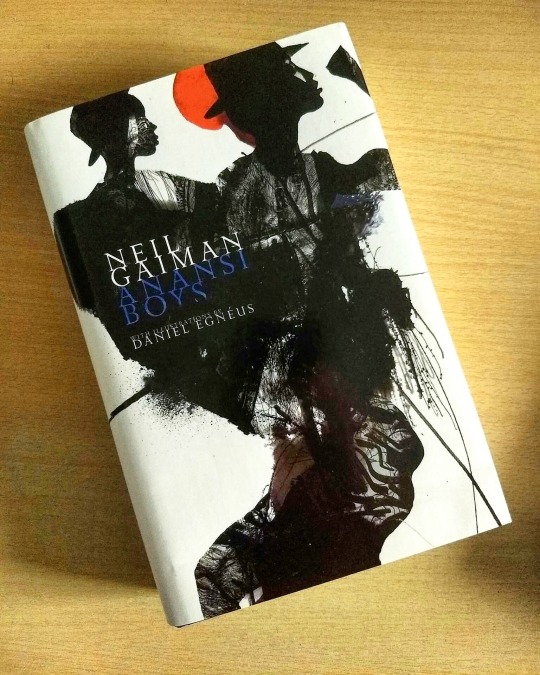
Anansi Boys is first and foremost, a comedy. Where American Gods was a thoughtful ponder of many existential questions, Anansi Boys is just a laugh. It’s not rip-roaringly hilarious like a Pratchett or a Douglas Adams novel, but rather has a wry, tongue-in-cheek humour to it that makes you chuckle. It follows a few months in the life of the rather awkward and uncharismatic Fat Charlie Nancy, the son of Mr. Nancy from American Gods. If you haven’t read American Gods, all you (and Charlie) need to know is that he is the African Trickster God, Anansi.

When Mr. Nancy drops dead mid singing and dancing on a karaoke stage in Florida, Fat Charlie’s life is turned upside down, as he must come to terms with the fact that his father was a God, and that he has a twin brother, Spider, somewhere in the world. Things only get weirder when Spider shows up at Charlie’s house in London, makes himself at home, and proceeds to show Charlie what the son of a Trickster God is truly like. What follows is an adventure of mistaken identities, ghost, Gods, and a number of very nice but odd old women.
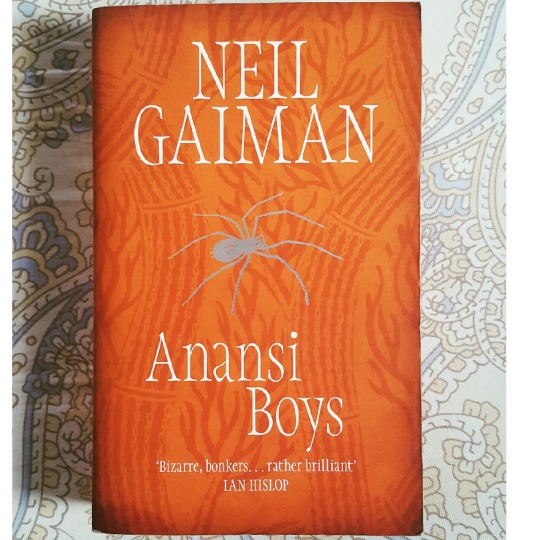
Of course, this book has the traditional lyrical prose of Gaiman, with his signature out of the box creativity and razor-sharp wit. Each page is a delight to read, and the book will often have you at the edge of your seat with the insane happenings in the plot, but when you finish, you will find yourself having gone through quite an adventure with Fat Charlie, and possibly, having, like Charlie, also changed a bit too.
Score:
8.5/10
[Instagram]

120 notes
·
View notes
Text
Book Review: ‘The Sleeper and the Spindle’ - Neil Gaiman & Chris Riddell

I read an article once that there are fairy tales we tell today that can be traced back over 6000 years, all the way to the Bronze Age. A part of me, The romantic who fell in love with stories as a kid, can’t help but smile in glee at that. And another part of me hopes that 6000 years on, Sleeper and the Spindle is the version of Sleeping Beauty that stays around.
If you have a copy of Neil’s Trigger Warning, then you already have a copy of Sleeper and the Spindle. It is there, nestled between stories of blue boxes, old grudges and massive dogs. Alternatively, you could also buy yourself the illustrated edition of this book. It is, quite without hyperbole, the prettiest book I have ever laid eyes on. Chris Riddell has outdone himself with his art: every drawing is so subtly detailed, every character so bold, and the burnished golden highlights on the pages only serve to make the black and white drawings all the more colourful. And of course, once you’re done admiring the artwork, there is the story to mesmerise you further.

Of course, we all know the Sleeping Beauty story. This is Gaiman’s retelling of it, and what a fantastic retelling it is. In its brief 72 pages, we meet a Queen who, on her wedding day, dons her armour and sword to go investigate a strange, almost magical sleep that has taken over her neighbouring kingdom. Along the way, Gaiman introduces us to other fairy tale characters we know and love, all the while quietly subverting many classic, oftentimes somewhat sexist tropes found in fairy tales, and tells you a story that is both familiar, and yet new and exciting. There are adventures and plot twists that leave you at the edge of your seat, all before an ending that will leave you smiling wistfully for a good ten minutes before turning back to page one.

By far the most refreshing thing about this story is probably just how unapologetically feminist Neil is throughout it. Most writers would have made the swap from Prince Charming to Princess Charming and called it a day, but Neil goes above and beyond, replacing the Prince with a Queen on a mission, and - well, many other things, most of which would sadly be spoilers. Amazingly, even though it is a short story, our Queen is still given a character arc of her own, a very relatable one too, which, by the end, will leave you wanting a 10 book series chronicling her life.
I could not possibly recommend Sleeper and the Spindle enough, especially to your daughters, so that they can see that they can be both the princess and the dragonslayer, and to your sons, who could use a few stories showing how strong their female counterparts can be.
Score:
10/10
[Instagram]

#Neil Gaiman#Chris Riddell#The Sleeper and the Spindle#Sleeping Beauty#Art#illustrations#tsundokutouched#booklr#book reviews#fairy tale
44 notes
·
View notes
Text
Book Review: The Scarlet Pimpernel - Baroness Orczy
Score: 6/10
[Instagram]
I first read the book when I was 12 years old. The abridged version. And I loved it. I loved it so much that 10 years later I sought out the unabridged version of the same book to reread it. I remember the book being absolutely thrilling and adventurous, packed with suspense, romance and action. However, as a 22 year old my experience reading this book completely changed. To the point that I was massively disappointed not only by the story itself but disappointed to have been disappointed by one of my childhood favourites.

The story takes place during the French Revolution more specifically during the Reign of Terror when massive general uprising was cruelly bringing down and putting to death all aristocrats of the then French society. The story never goes into or even hints why the uprising happened in the first place and the cruelty and ignorance of the aristocrats pre-revolution. Baroness Orczy, herself was of aristocratic origin and from her writing it can be clear that she sympathized with the ruling class and hence painted a very one-sided picture with her story.
Amidst this chaos during the revolution when aristocrat after aristocrat were losing their heads to the guillotine, a certain Englishman going by the pseudonym of the Scarlet Pimpernel was cunningly helping them escape their fate by smuggling them into English soil. This Englishman, though obviously the leader, was not working alone and had a group of faithful men at his service. They called themselves the League of the Scarlet Pimpernel.
The story itself is told through the eyes of Marguerite St. Juste/Blakeney - a beautiful, witty French woman who is married to a somewhat boring, yet handsome, and rich Englishman named Sir Percy Blakeney, and who took the English society by storm with her beauty and fashion. Don't get me wrong the story is still very enjoyable and the suspense and mystery about the identity of the Scarlet Pimpernel is well written by Baroness Orczy. However, the character of Marguerite Blakeney though full of potential still left a lot to be desired. She was brave and clever, however her bravery and cleverness was of no use to the plot after the end of the story.
[Spoilers below the cut]
She was brave enough go into the enemy land to look save the man she loved but her going there and her bravery was absolutely needless since the man ended up saving her and doing everything else he had gone to France to do. To be perfectly honest, she was more of a hindrance to his plans than anything. I don’t know how much to credit her character for just being brave.
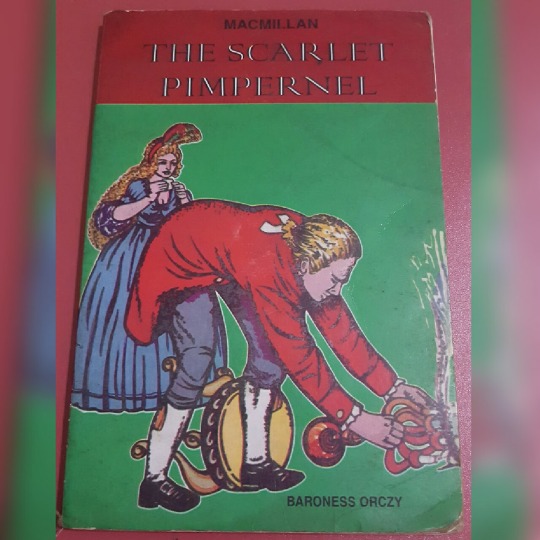
Furthermore, even though the writer tried very hard to not make Marguerite’s character shallow, she failed to do so in certain instances. Marguerite was married to Sir Percy Blakeney and it was said over and over again that she married for love and not his wealth. However, after the disclosure of certain events the marriage was slowly becoming quite loveless. And Marguerite and Percy were both stubborn individuals and refused to talk about their issues. But here’s why Marguerite’s character seemed shallow to me. Before finding out that her otherwise boring husband Sir Percy was actually the Scarlet Pimpernel she was slowly falling out of love with him because he didn’t give her the benefit of the doubt regarding some “atrocious” things she did back in France. However, finding out that her husband was in fact the Scarlet Pimpernel did not change that perception that Percy had of her in her mind. Yet she instantly fell in crazy love with him again just because she found out he was not only brave but renowned in both countries for his bravery and forgot all about the previous hurt that Percy had inflicted upon her with his behavior. Suddenly, just after this revelation Sir Percy Blakeney transformed in her eyes from a man she detested to a man she worshipped. Go figure.
The second reason as to why she seemed shallow concerns her elder brother Armand, who was secretly working for the Scarlet Pimpernel. Armand was more than just a brother to her - he was the parent she never had. He brought her up after the death of their parents and showered her with love and affection. Yes she did do things, even illegal and immoral things for the wellbeing of her brother but in an instance when it came down to saving her brother, who had always loved and protected her and her husband who routinely tried to ignore her, she chose her husband just because he was the Scarlet Pimpernel and I guess the notion of her husband being the elusive, brave English hero was just really sexy to her.
[End Spoilers]
I wouldn't recommend this book very strongly, especially not to the female younglings who are looking for role models in life because reading about a brave and clever woman who is still a damsel in distress, to be, at the end of the day, saved by a strong and handsome man is everything that they don't need to read to become confident women in society. However for adults, if you want a soft romance, suspense and mystery story please do pick up this book because it was an enjoyable story if you could ignore and look past the drawbacks.
Perception really does change a whole lot in 10 years.
Happy reading!
#The Scarlet Pimpernel#baroness orczy#superheros#book reviews#booklr#classics#romance#mystery#french revolution#history#suspense
2 notes
·
View notes
Text
Book Review: “Born a Crime” by Trevor Noah
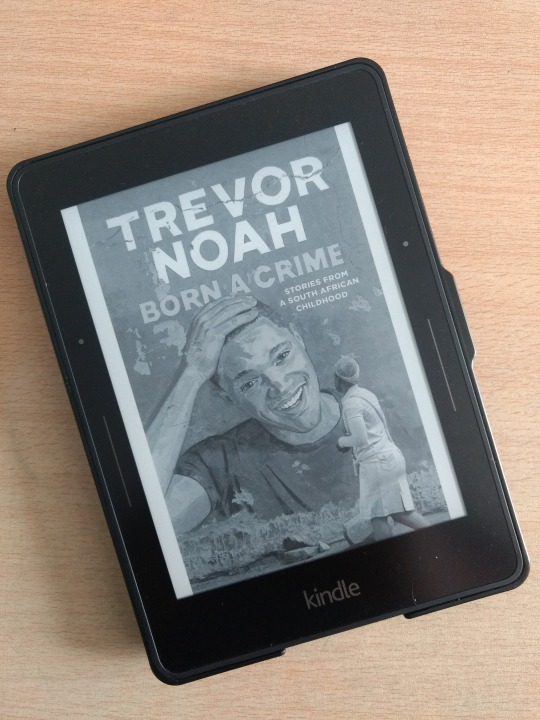
I finished this book in one sitting and I read the entire book in Trevor Noah’s voice. The gripping factor about this book was that the entire book seemed like a story but then it would constantly hit you that it wasn’t and in fact every event described was actually someone’s life. It’s similar to the feeling you get when you’ve watched an exhilarating movie and then on the screen flashes the words “Based on true events” and you’re like “holy shit!”
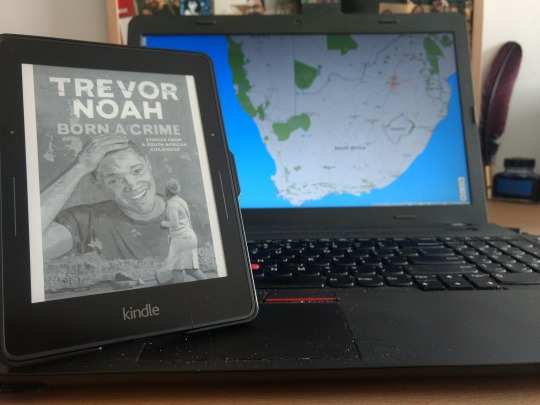
Trevor Noah writes in this book about his life growing up in South Africa amongst oppression, racism and poverty. And he moreover he writes it like a story nicely dividing his chapters with continuations, those comic moments where you’d just burst out laughing and even putting a “what-the- hell-just- happened” plot twist in the end. What was most beautiful about this book was how he wrote about the concept of racism. We see Trevor Noah’s stand-up comedy (at least I do) and we can clearly see the most vital topic of most of his stand-up is racism and how he basically slaughters that concept. The book was no different. Here, we get a first-hand account of the last days of the apartheid in South Africa, how society was during and how it changed after. Trevor Noah was a mixed child with a black South African mother and a white Swiss-German father. During the time of the apartheid, intermixing of races was strictly prohibited by law. And Noah describes his life growing up as a misfit; unable to belong in any particular group.
One thing the review cannot go on without mentioning is regarding one particular character. And that is Trevor Noah’s mother, Patricia Noah. She might just be one of the most independent and strongest females I have ever read about. So much so that during most times her life and her adventures and experiences would draw me in more than Trevor’s. She showed me that there are no barriers whether that be societal or political or even economic that can hinder a woman from becoming independent and strong as long as she chooses to be. This book mostly highlighted the bond between mother and son and how together they tackled the difficult times.
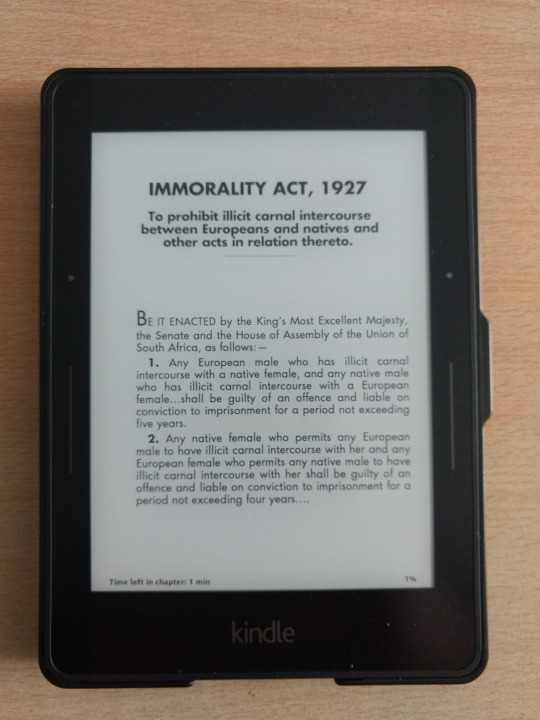
I thoroughly enjoyed this book. It was emotionally moving and very thought provoking. If you want to know more about the apartheid, the internal South African tribal conflicts and just how it must have been to grow up a mixed child in a country which had no place for one, I would definitely recommend this book.
Happy reading!
Rating: 9/10
[Instagram]
2 notes
·
View notes
Text
Book Review: “American Gods” by Neil Gaiman

Every once in a while, one comes across a book that is, inexplicably, a little different. Oh, but it sits on the shelf just as an ordinary book would, gathering dust until you pick it up and open the soft paperback cover. You sit down and your eyes glance over the first few pages – a dedication, a disclaimer, a warning for those about to get lost in it. And as the weight of the book slowly settles in your hands, becoming more familiar and comfortable with each passing page, a spell is cast. You do not know it at the time, you feel nothing. But the you who finishes these few hundred pages will not be the you who started them. You will be different – changed in inexplicably small ways, but with a gravitas you did not have before. These books come around rarely – for some, maybe once in a lifetime, others, slightly more often. But one such book, for us at least, was Neil Gaiman’s American Gods.
American Gods, like many Gaiman books, features a very wallflower protagonist. There’s nothing too extraordinary about Shadow Moon, aside from his penchant for coin tricks. Shadow is a down on his luck ex-con, released from jail a few days early due to the death of his wife, Laura. On his way back home, he runs into Mr. Wednesday, a suave, but cryptic old man who offers him a job as a bodyguard. What follows is a road trip around America as Mr. Wednesday, with Shadow in tow, tries recruiting a number of strange folk to a supposed upcoming war. He says the folk are Gods, not Gods like Zeus and Poseidon, but older Gods, those forgotten by time and misplaced by human memory. Gods abandoned by their believers for the shiny, newer Gods of Internet and TV. And he claims that that is the war they must fight, for their very existence, against these New Gods who wish nothing more than to wipe out the Gods of yore, cleanse the slate and start afresh.

On the surface, American Gods is a long, rambling, fantasy road trip through America and its’ history. The length, the rambliness, the often vague sense of direction as to where the plot is headed, and Gaiman’s poetic prose all make the book exist in a sort of liminal space in the reader’s mind - an atmosphere where the real and surreal quietly blur into each other. Once Gaiman has you in this space, he dips the story into moments so incredibly fantastical and surreal, it should not be possible to imagine them with the human brain. And yet, not once does the immersion break - these moments are when the book is at its’ most visceral and tangible, and once you stop reading, you are left in a daze where reality is a bit different, and the impossible seems only improbable.

Of course, all that is just at the surface. This book is teeming with subtext, to the point where it breaks through in places and isn’t even subtext anymore. At its heart, American Gods is an immigrant story, told through the eyes of the immigrant Gods. It is the story of people, and Gods, coming to America – scared, afraid, feeling alien in an unfamiliar land. It is the story of them changing, leaving bits of their old customs and traditions behind, picking up new bits to better suit the new world. As a child of immigrants, and an immigrant myself, the story told in this book is deeply personal and relatable. I have seen my parents, much like the Gods, yearn for a home and a time that is more in their memories than anywhere else. I, myself, have found myself quietly tucking away bits of me to become more palatable to those around me. This is a book about identity and change, and about living in a world where you are not, and will never really will be completely at home.
Being a book about immigrants, their Gods and their cultures, the book is obviously teeming with a very varied cast of characters. The diversity is at the core of what makes this book so universal and real – you find Gods and folklore from across the globe. Characters from Hindu mythology stand side by side with those from Islamic and African folklore. Christian figures and the Egyptian Gods co-exist in the same America as the Norse Gods, and other far forgotten Gods of Native America, and Eastern Europe. And while it would have been a very easy mistake for Gaiman to appropriate these figures, he instead treats them all with immense reverence and respect: not a single God feels ever out of place, let alone mocked.
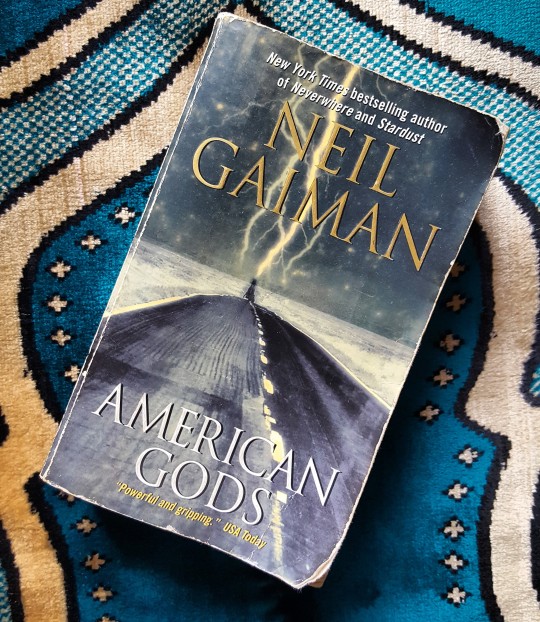
Another highlight of this book is in its protagonist, Shadow. There really is nothing too special about Shadow. He is not exceptionally clever, or suave. If anything, he is a bit awkward. He is strong and large, but throughout the book he carries himself with a gentleness. He is polite, and soft-spoken, often preferring to listen rather than speak. From a character who could easily have been an alpha male, he is a welcome change. But probably the most relatable aspect of Shadow is that he is a man who is lost. At the beginning of the book, he is a man out of jail, and out of a job, heading to the funeral of the love of his life. He is then thrust into a world he has no clue about, into a scheme that he knows nothing of. Shadow starts off lost, in shock, and beyond confused, and throughout the book, we see him slowly recover from the grief, pick up his emotional pieces and, as the plot opens up to both us and Shadow, so does Shadow to the reader. Slowly, imperceptibly at first, but he does so, enough so that as you close the last page, you feel a lingering companionship with him – a comfortable one, a friendship, if you will. Because after all, Shadow is every one of us who has ever been lost in life, and slowly picking up the pieces as we go along.
American Gods is in many respects more a journey than a book. It is a road trip across America, and a trip into an experience many share, but isn’t often talked about. And it brings up a conversation that, in today’s political climate, is much needed to be had. It is a story that is capable of bridging people - communities even, making us see the more vulnerable bits of each other. Some, if not most, are changed by this book in ways that are hard to describe. Should you pick it up, there is a chance you will not be the same person at the end of it. And you should definitely pick this book up.
Score: 10/10
(We wanted to give it more, we really did.)
[Instagram]
#booklr#book reviews#Neil Gaiman#American Gods#STARZ#american gods starz#tsundokutouched#admin: kangaroo
75 notes
·
View notes
Text
Book Review: “All The Light We Cannot See” - Anthony Doerr

If you want a good World War II novel this is a book you should definitely pick up. Doerr paints a vivid picture of the streets of Paris and of Saint-Malo making you feel like you are walking those streets yourself as you read. Two stories are run in parallel: one concerns a German boy by the name of Werner who lost both his father in the coal mines and lives in an orphanage with his little sister. He later joins the Hitler youth and his story commences from there. Werner makes friends and his knack to fix electronics also earns him some enemies besides garnering him that spot at the Academy. The other story is that of a girl in Paris, Marie-Laure. She lives with her father, a master of locks in the Museum of Natural History. She went blind by the age of six due to a degenerative disease and her father built her the perfect little model of her area so she could navigate her way home. After the Germans hit Paris they had to relocate to the walled citadel of Saint-Malo and that’s where her story starts to unravel.
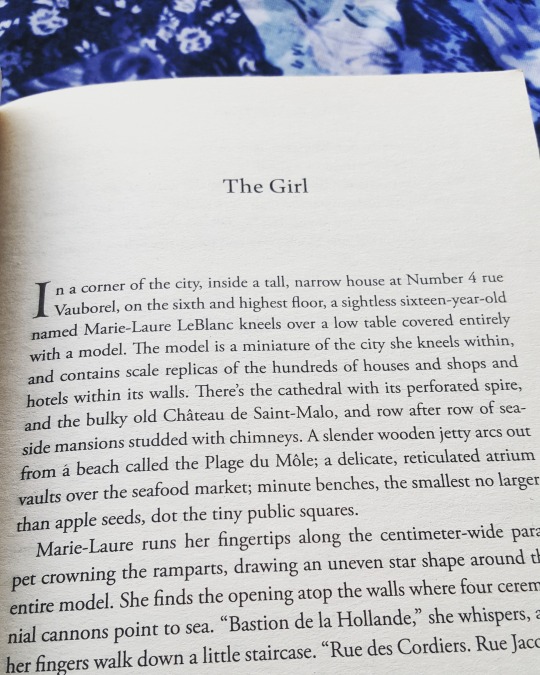
It’s difficult to say much about this book without giving away spoilers. Each chapter is a story in itself, all woven together with intricate little details. It’s these little details that made you not only picture but feel the surroundings and the atmosphere being described. For me it was almost like I was living Marie-Laure’s life in a war-torn France and then also living the life of a Hitler Youth in Germany where fascism was on the rise. It felt like I was there with Werner in every step of his journey. This book was quite simply beautifully written. Every chapter was short, maximum of two to three pages each but even then the continuity flowed. In fact right after I finished one chapter of Marie-Laure I instantly began the next because I wanted to know what’s up with Werner now and the cycle continued.
Anthony Doerr crafted a living story in those pages and it’s a highly recommended book to read. I promise you won’t be disappointed.
Happy reading.
Score: 9/10
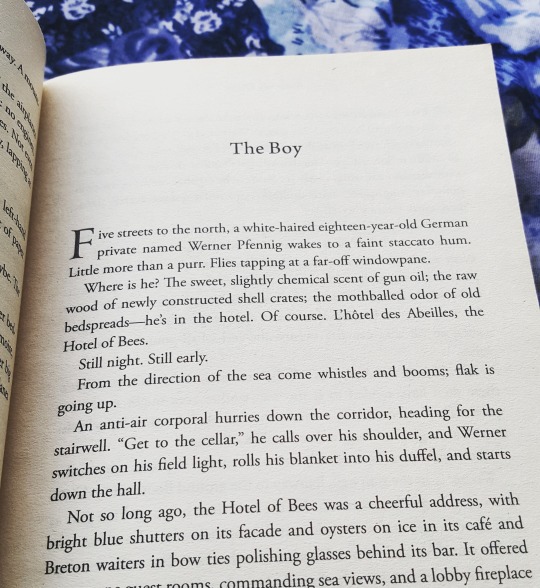
19 notes
·
View notes
Text
dulraidh replied to your post “Review: The Mistborn Trilogy”
sounds good... very detailed rewiev, yet no spoilers. nicely done! and i am definitely interested now :)
Why thank you :)
We’ll hopefully get around to reading more Sanderson books soon, so you should totally stick around if you like that kinda fantasy. We mainly do fantasy anyway. We’re suckers for it. :P
But so glad you enjoyed the review :) Do tell us how you like it once you read it!
2 notes
·
View notes
Text
Review: The Mistborn Trilogy
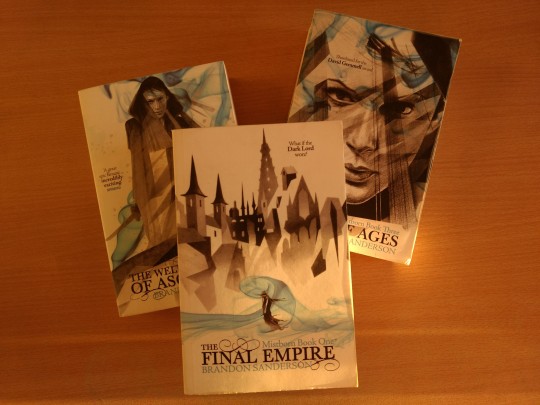
A warning for the wise: if you have an exam coming up, and need to study, do not read this series. Should you be planning what books to pack for a trip away with friends, put this series down; it can wait. Your social life and your trip will thank you. But, if you are like me and perfectly enjoy stabbing yourself in the foot and finding yourself awake at 3 A.M. the night before a big exam, reading what you swear is the last chapter for the day, then please, pick up The Final Empire. Don’t say I didn’t warn you though.
Mistborn follows the story of Vin, an orphaned street thief who finds herself adopted into a band of thieves planning the biggest heist in recorded history, one which, should all go well, would end with a slave uprising, the fall of the nobility, and the coup of the tyrannical, and supposedly immortal Lord Ruler. The series is well balanced with fast paced action, mystery, and a healthy enough dose of classic fantasy trope subversion to keep readers continuously on their toes. To say anything more would be to spoil, but suffice to say, this was all I required to pick up the first book.
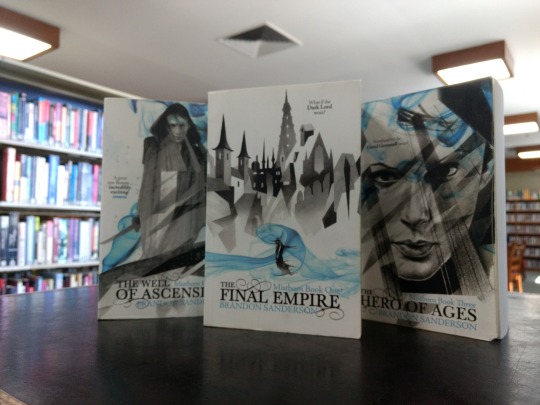
Set in a grim world only just entering its industrial age, Mistborn lies squarely within the realm of high fantasy. And in that genre, Sanderson effortlessly marks himself out from his peers. His worldbuilding is exquisite: each city we enter feels alive and different, and the different cultures and religions are all superbly fleshed out. Sanderson knows just how long to spend worldbuilding too. He knows just when we require a cursory glance and the illusion of depth, versus the times we require more detail to make the world seem believable. Unlike many authors, he knows not to bore with information dumps, opting rather instead to weave the lore seamlessly into the narrative, occasionally having the characters asking the same questions as the reader, a situation which in less capable hands would seem garish and annoying, but he manages to keep it intriguing.
What is most outstanding about his worldbuilding however is his magic system. I have heard Allomancy to be described as a Full Metal Alchemist-esque magic system, in the way that there are, to an almost scientific degree, rules that both the readers and the characters know of, and yet still enough mystery and vagueness that it remains magical. The rules also make sure that the magic can never be used as a deus ex machina to get our protagonists out of trouble easy. Allomancy is also unique in how it works - it has the benefit of being an incredibly simple idea done very well. And when we start encountering Allomantic fights, Sanderson never once fails to make you feel the breakneck pace of the combat, or the heightened danger, or the incredible power wielded by the Allomancers; and he never slows it down with unnecessary collateral destruction. Pages of fighting flip by in seconds and leave you standing breathless among the corpses of our hero’s enemies.
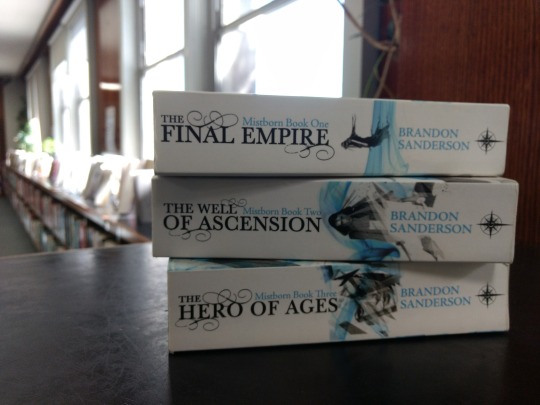
Speaking of heroes, the series’ biggest selling point is arguably it’s protagonist. In a genre plagued by the frankly uncomfortable number of male protagonists and underdeveloped female characters, Vin stands squarely apart. She is incredibly well fleshed out: strong, vulnerable, feminine, and badass, with none of the sexist “not like other girls” bullshit. She is her own character, with her own agency, flaws, insecurities, likes and dislikes and is just a very believably written girl, albeit with super powers. The other characters too are never boring or interchangeable, and the character dynamics come across vividly the moment they set foot in the scene. The one gripe I would put forward is that, in concentrating on making Vin a well-rounded character, Sanderson fell victim to the classic blunder of not including many other prominent female roles. While other female characters do exist, it is arguable if all the books pass Bedchel, which although not the best of markers, is still disappointing. Sanderson has, however, expressed his regret at this oversight, and is working to make sure his other books are better. And while this is most definitely a flaw in the series, it is not one I would consider a deal breaker, especially when given how well Vin, and indeed, the rest of the entire series is written.
Another point I would like to touch upon may verge into spoiler territory. I shall be as vague as possible, but if you do not wish your reading experience be tainted at all, I suggest you skip the upcoming paragraph.
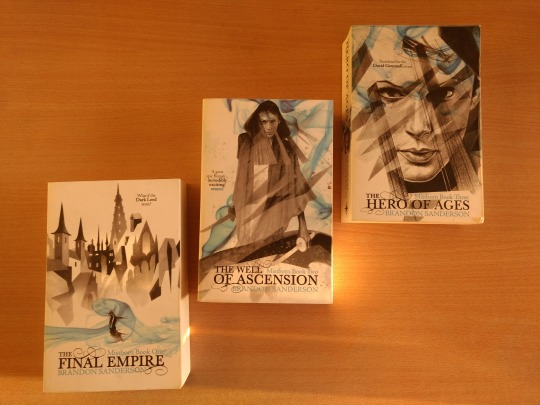
One thing Sanderson did well in this series, which I have seen few authors do this well, is deal with an explicitly mentally ill character. At one point in the series, a character falls into depression. They lose all motivation and purpose in their life, and each day becomes a chore for them. Thanks to the writing, you can really feel the sheer slog of depression, the completely lifelessness of the characters’ existence, get into their skin in a way that is eye opening for those who have never experienced it, and comforting for those who have, altogether without drying the narrative flow, or becoming a dead weight. It is something small, but handled well, and for someone like me who deals with depression, a comfort to read.
Overall, The Mistborn Trilogy is a masterclass in high fantasy literature. The worldbuilding is top notch, the characters are flawed, believable and ultimately lovable, the magic inventive and immersive, and the fights pristine. Whether you are a veteran fantasy fan looking for something different from the classic sword-and-sorcery, or a teenager who needs a good female role model in their books, I could not recommend Mistborn enough. It will grab you tight, and take you on an adventure you will not be able to put down, and leave you three books later emotionally compromised in the best of ways.
Scores
Mistborn: The Final Empire: 9.5/10
Mistborn: The Well of Ascension: 9.0/10
Mistborn: The Hero of Ages: 8.5/10
Overall: 9.5/10
(Note: Overall score is not an average, but rather a mark of how well each of the books tie into and enhance each other and how complete the series feels)
[Instagram]
#Mistborn#The Final Empire#The Well of Ascension#The Hero of Ages#Brandon Sanderson#Cosmere#book reviews#tsundoku touched#booklr#admin: kangaroo
188 notes
·
View notes
Text
Review: “The Ocean at the End of the Lane” by Neil Gaiman

“I remember my own childhood vividly…I knew terrible things. But I knew I mustn’t let adults know I knew. It would scare them.” Says the epitaph of this short-story-turned-novella. In truth, everything there is to be told in this story is summarised in these few words. If those words do nothing for you, you may stop reading after them. You will lose no face. No one will think less of you. But continue past, and you will find yourself slowly adrift in what may be one of Neil Gaiman’s most vivid and fantastical works yet.

“The Ocean at the End of the Lane”, or as I lovingly call it, “Ocean”, tells the story of a man – middle aged and a bit lost in his life – who returns to his childhood town for a funeral. There are awkward questions, and empty hugs, and, to take a break from it all, he takes a drive down to where his childhood home was, and to the farm at the end of the lane. And then the memories start flooding back – Old Mrs. Hempstock, who sews space and time; Mrs. Hempstock, who knows just how to comfort a 7-year-old child with roast beef and pie; and Lettie, who thought the duckpond was an Ocean.
Much of the novella is mainly a flashback, told through the patchwork memories of the narrator of his childhood self, of how the suicide of a lodger in his childhood home accidentally brought forth eldritch beings into his life - beings everyone else seemed to believe were human, except of course his friend Lettie of Hempstock Farm.
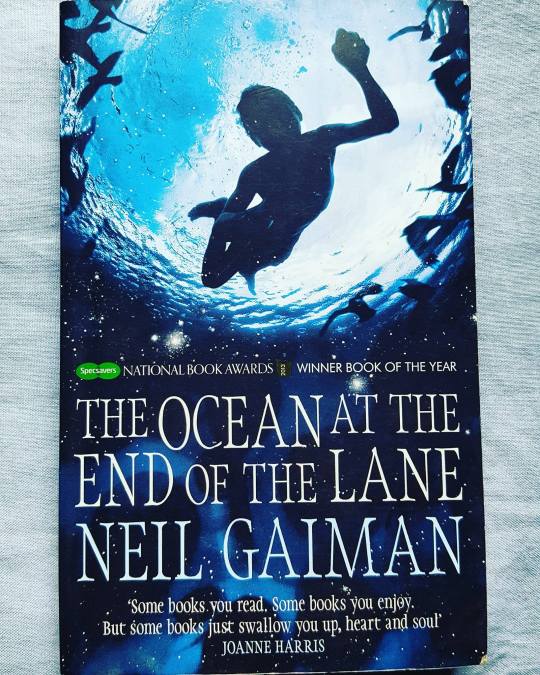
The book shows us the world through the eyes of a child – scary, fantastic, where adults are infallible Gods and where the faerie ring in your backyard truly is magical. And Gaiman, as always, does not fail to make the reader feel the magic in their very bones. He writes into you a innocent sense of wonder and vulnerability as quantum physics collides with fairy tales, and the fantastic is very much woven into the mundane in the way few authors can weave. And childhood comes rushing back and leaves you wondering if the dragons you fought afterschool everyday were not actually figments of your imagination like you’d thought all this time.
I could call “Ocean” a lot of things, but I feel it is best described as a children’s book for adults – the ones who avidly dwell in fantasy to try keep the child inside alive, and the ones who haven’t picked up a fantasy book in years for some fear of looking foolish. This is a book for the lost twenty-somethings, fresh out of university and flailing in the wide world, and the older variant of lost human who found themselves in a bookshop on the way to buy a fast car. It is as intimate as a long hug from a loved one, and softer too, and warm, and probably actually magical. It is, in a word, a Gaiman.
Score: 10/10

#Neil Gaiman#book reviews#The Ocean at the End of the Lane#Ocean at the End of the Lane#tsundoku touched#booklr#admin: kangaroo
64 notes
·
View notes